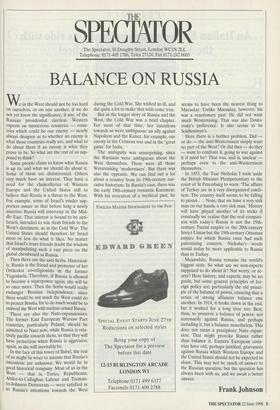SPEdf\TOR
The Spectator, 56 Doughty Street, London WC1N 2LL Telephone: 0171-405 1706; Telex 27124; Fax 0171-242 0603
BALANCE ON RUSSIA
We in the West should not be too hard on ourselves, or on one another, if we do not yet know the significance, if any, of the Russian presidential election. Western experts on mysterious countries — coun- tries which could be our enemy — nearly always disagree as to whether an enemy is what those countries really are, and what to do about them if an enemy is what they prove to be. So what are the rest of us sup- posed to think?
Some people claim to know what Russia is up to, and what we should do about it. Some of them are disinterested. Others very much have an interest. They have a need for the chancelleries of Western Europe and the United States still to believe that Russia is a threat to the West. For example, some of Israel's cruder sup- porters assure us that before long a newly assertive Russia will intervene in the Mid- dle East. That interest is bound to be anti- Israeli, intended to win Arab friends to the West's detriment, as in the Cold War. The United States should therefore let Israel more or less do what it likes. No matter that Israel's truer friends doubt the wisdom of manipulating such a vast piece on the global chessboard as Russia.
Then there are the anti-Serbs. Historical- ly, Russia is the friend and protector of her Orthodox co-religionists in the former Yugoslavia. Therefore, if Russia is allowed to become a superpower again, she will be so once more. Then the Serbs would really endanger Bosnian independence, since there would be not much the West could do to protect Bosnia, for to do much would be to embroil the West with nuclear-armed Russia.
There are also the Nato-expansionists. The former East European Warsaw Pact countries, particularly Poland, should be admitted to Nato now, while Russia is rela- tively pacific towards them, so that they will have protection when Russia is aggressive again, as she will inevitably be.
In the face of this tower of Babel, the rest of us might be wiser to assume that Russia's intentions are unknown. We would be in good historical company. Most of us in the West — that is, Tories, Republicans, Attlee-to-Callaghan Labour and Truman- to-Johnson Democrats — were satisfied as to Russia's intentions towards the West during the Cold War. She wished us ill, and did quite a lot to make that wish come true.
But in the longer story of Russia and the West, the Cold War was a brief chapter. For most of that time, her intentions towards us were ambiguous: an ally against Napoleon and the Kaiser, for example, our enemy in the Crimean war and in the 'great game' for India.
The ambiguity was unsurprising, since the Russians were ambiguous about the West themselves. There were all those Westernising 'modernisers'. But there was also the opposite. We can find out a lot about a country from its 19th-century nar- rative historians. In Russia's case, there was the early 19th-century romantic Karamzin. With his evocation of a mythical past, he seems to have been the nearest thing to Macaulay. Unlike Macaulay, however, his was a reactionary past. He did not want much Westernising. That was also Dosto- evsky's preference. It also seems to be Solzhenitsyn's.
Here there is a further problem. Did or do — the anti-Westernisers simply want no part of the West? Or did they — do they — want to confront it, going to war against it if need be? That was, and is, unclear perhaps even to the anti-Westernisers themselves.
In 1853, the Tsar Nicholas I took aside the British Minister Plenipotentiary to the court of St Petersburg to warn: 'The affairs of Turkey are in a very disorganised condi- tion. The country itself seems to be falling to pieces . . . Note, that we have a very sick man on our hands, a very sick man.' History will have played another of its tricks if eventually we realise that the real compari- son with today's Russia is not the 19th- century Tsarist empire or the 20th-century Soviet Union but the 19th-century Ottoman empire for which Russia once had such patronising concern. Nicholas's words would today be more applicable to Russia than to Turkey.
Meanwhile, Russia remains the world's biggest state. So what are we non-experts supposed to do about it? Not worry, or re- arm? Here history, and experts, may be no guide, but some general principles of for- eign policy are: particularly the old princi- ple of the balance of power, ensuring that a series of strong alliances balance one another. In 1914, it broke down in the end, but it worked for a long time too. Best, then, to preserve a balance of power, not necessarily against Russia, and perhaps including it, but a balance nonetheless. This does not mean a precipitate Nato expan- sion. That might provoke Russia rather than balance it. Eastern European coun- tries have old, perhaps justified, grievances against Russia which Western Europe and the United States should not be expected to share. This may not be much of answer to the Russian question, but the question has always been with us, and we await a better answer.
Frank Johnson


























































 Previous page
Previous page